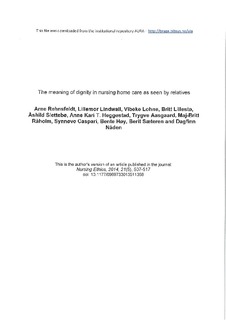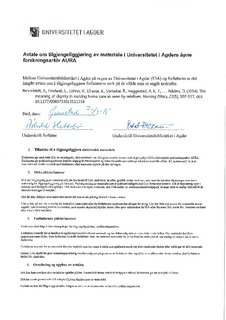| dc.contributor.author | Rehnsfeldt, Arne | |
| dc.contributor.author | Lindwall, Lillemor | |
| dc.contributor.author | Lohne, Vibeke | |
| dc.contributor.author | Lillestø, Britt | |
| dc.contributor.author | Slettebø, Åshild | |
| dc.contributor.author | Heggestad, Anne Kari T. | |
| dc.contributor.author | Aasgaard, Trygve | |
| dc.contributor.author | Råholm, Maj-Britt | |
| dc.contributor.author | Caspari, Synnøve | |
| dc.contributor.author | Høy, Bente | |
| dc.contributor.author | Sæteren, Berit | |
| dc.contributor.author | Nåden, Dagfinn | |
| dc.date.accessioned | 2015-03-17T09:00:30Z | |
| dc.date.available | 2015-03-17T09:00:30Z | |
| dc.date.issued | 2014 | |
| dc.identifier.citation | Rehnsfeldt, A., Lindwall, L., Lohne, V., Lillestø, B., Slettebø, Å., Heggestad, A. K. T., . . . Nåden, D. (2014). The meaning of dignity in nursing home care as seen by relatives. Nursing Ethics, 21(5), 507-517. doi: 10.1177/0969733013511358 | nb_NO |
| dc.identifier.issn | 0969-7330 | |
| dc.identifier.uri | http://hdl.handle.net/11250/279422 | |
| dc.description | Author's version of an article in the journal: Nursing Ethics. Also available from the publisher at: http://dx.doi.org/10.1177/0969733013511358 | nb_NO |
| dc.description.abstract | Background: As part of an ongoing Scandinavian project on the dignity of care for older people, this studyis based on 'clinical caring science' as a scientific discipline. Clinical caring science examines how groundconcepts, axioms and theories are expressed in different clinical contexts. Central notions are caringculture, dignity, at-home-ness, the little extra, non-caring cultures versus caring cultures and ethicalcontext - and climate.Aim and assumptions: This study investigates the individual variations of caring cultures in relation todignity and how it is expressed in caring acts and ethical contexts. Three assumptions are formulated:(1) the caring culture of nursing homes influences whether dignified care is provided, (2) an ethos that isreflected on and appropriated by the caregiver mirrors itself in ethical caring acts and as artful caring inan ethical context and (3) caring culture is assumed to be a more ontological or universal concept than,for example, an ethical context or ethical person-to-person acts.Research design: The methodological approach is hermeneutic. The data consist of 28 interviews withrelatives of older persons from Norway, Denmark and Sweden.Ethical considerations: The principles of voluntariness, confidentiality and anonymity were respectedduring the whole research process.Findings: Three patterns were revealed: dignity as at-home-ness, dignity as the little extra and nondignifyingethical context.Discussion: Caring communion, invitation, at-home-ness and 'the little extra' are expressions of ethicalcontexts and caring acts in a caring culture. A non-caring culture may not consider the dignity of itsresidents and may be represented by routinized care that values organizational efficiency andinstrumentalism rather than an individual's dignity and self-worth.Conclusion: An ethos must be integrated in both the organization and in the individual caregiver in orderto be expressed in caring acts and in an ethical context that supports these caring acts. | nb_NO |
| dc.language.iso | eng | nb_NO |
| dc.publisher | SAGE Publications | nb_NO |
| dc.subject | caring | nb_NO |
| dc.subject | caring culture | nb_NO |
| dc.subject | clinical caring science | nb_NO |
| dc.subject | dignity | nb_NO |
| dc.subject | ethical context | nb_NO |
| dc.subject | nursing home | nb_NO |
| dc.subject | relatives | nb_NO |
| dc.title | The meaning of dignity in nursing home care as seen by relatives | nb_NO |
| dc.type | Journal article | nb_NO |
| dc.type | Peer reviewed | nb_NO |
| dc.subject.nsi | VDP::Medical disciplines: 700::Health sciences: 800::Nursing science: 808 | nb_NO |
| dc.source.pagenumber | 507-517 | nb_NO |
| dc.source.volume | 21 | nb_NO |
| dc.source.journal | Nursing Ethics | nb_NO |
| dc.source.issue | 5 | nb_NO |
| dc.identifier.doi | 10.1177/0969733013511358 | |

